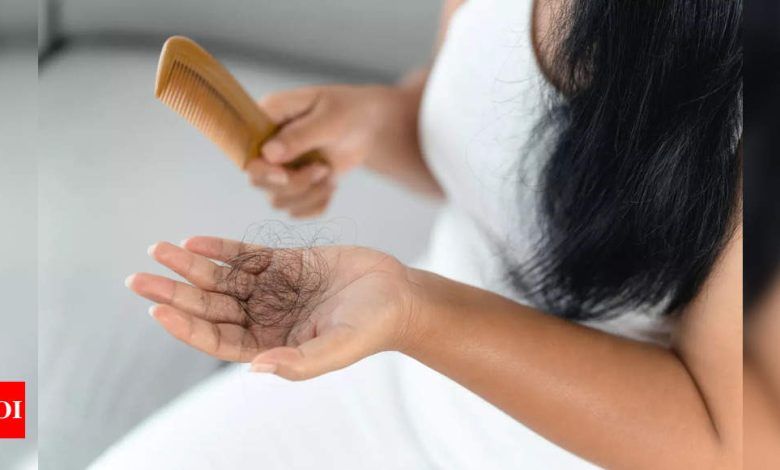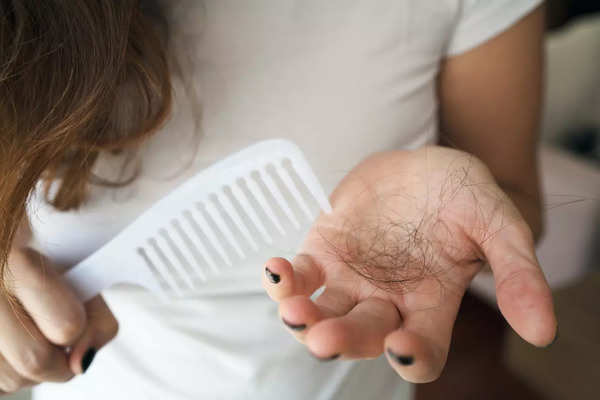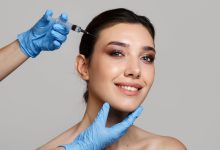Are you losing hair at a breakneck speed? Here’s what you need to know

Experiencing rapid hair loss can be a distressing and perplexing issue. Whether it’s thinning patches, excessive shedding, or noticeable bald spots, understanding the underlying causes of accelerated hair loss is essential for addressing and managing the problem effectively. Let us tell you the various reasons behind rapid hair loss, offer actionable solutions to mitigate it.
Understanding rapid hair loss
Hair loss, medically known as alopecia, can manifest in different forms and intensities.When hair loss occurs at an alarming rate, it can be indicative of several underlying issues. While losing 50-100 hairs a day is considered normal, losing significantly more can signal a problem. Rapid hair loss can affect both men and women, and its causes can range from genetic factors to lifestyle and health conditions.
Common causes of rapid hair loss
Genetic factors: The most prevalent cause of rapid hair loss is androgenetic alopecia, commonly known as male or female pattern baldness. This hereditary condition results in progressive hair thinning and loss due to genetic predisposition. It typically follows a pattern of receding hairlines and thinning crowns in men, and diffuse thinning in women.
Hormonal imbalances: Hormonal changes can significantly impact hair growth. Conditions such as polycystic ovary syndrome (PCOS), thyroid imbalances, and menopause can lead to sudden or severe hair loss. An overproduction or deficiency of certain hormones can disrupt the normal hair growth cycle, leading to accelerated shedding.
Nutritional deficiencies: Hair health is closely linked to nutrition. Deficiencies in key vitamins and minerals such as iron, zinc, vitamin D, and B vitamins can impair hair growth and lead to hair loss. A poor diet lacking essential nutrients can weaken hair follicles and result in thinning hair.
Stress and trauma: Emotional stress, trauma, and significant life changes can trigger a type of hair loss known as telogen effluvium. This condition causes hair to enter the shedding phase prematurely, leading to noticeable thinning. Severe stress can disrupt the hair growth cycle and exacerbate hair loss.
Medical conditions and medications: Certain medical conditions, such as autoimmune disorders (like alopecia areata) and chronic illnesses, can lead to rapid hair loss. Additionally, medications such as chemotherapy drugs, anticoagulants, and some antidepressants can have hair loss as a side effect.
Scalp conditions: Conditions such as dandruff, psoriasis, and fungal infections can affect the health of the scalp and disrupt hair growth. Infections or inflammation of the scalp can lead to hair thinning and loss.
Effective solutions and preventive measures
Consult a healthcare professional: If you’re experiencing rapid hair loss, seeking advice from a healthcare professional or a dermatologist is crucial. They can perform tests to determine the cause of your hair loss and recommend appropriate treatments.
Address nutritional deficiencies: A balanced diet rich in essential nutrients can support hair health. Incorporate foods high in protein, iron, omega-3 fatty acids, and vitamins. Consider a multivitamin or specific supplements if recommended by a healthcare provider.
Manage stress: Implementing stress management techniques can help mitigate stress-related hair loss. Practices such as mindfulness, meditation, exercise, and therapy can contribute to overall well-being and reduce hair loss triggered by stress.
Hair care practices: Adopt gentle hair care practices to minimize damage. Avoid using harsh shampoos and heat styling tools excessively. Opt for a wide-toothed comb to detangle hair and use a silk or satin pillowcase to reduce friction.
Medical treatments: There are several medical treatments available for hair loss. Minoxidil and finasteride are FDA-approved medications that can help stimulate hair growth and prevent further loss. For more severe cases, options such as corticosteroid injections, laser therapy, or hair transplant surgery may be considered.
Scalp care: Addressing scalp conditions can promote healthy hair growth. Use medicated shampoos for conditions like dandruff or psoriasis and consult a dermatologist for persistent scalp issues. Regular scalp massages can also improve blood circulation and support hair growth.
5 Essential oils everyone must have for pain relief and overall health
Preventive measures
Regular check-ups: Regular medical check-ups can help identify any underlying health issues that might be contributing to hair loss. Addressing these conditions promptly can prevent further hair loss.
Avoid tight hairstyles: Hairstyles that pull tightly on the hair, such as ponytails or braids, can cause traction alopecia. Opt for looser hairstyles to reduce stress on hair follicles.
Be cautious with hair treatments: Limit the use of chemical treatments and avoid over-processing your hair. If you must dye or chemically treat your hair, choose products that are less harsh and give your hair time to recover between treatments.
Source: times of india
Related Posts
- 12 Coconut Perfumes That Smell Like an Expensive Vacation (and Not Sunscreen)
- The 6 Hats Everyone Will Be Wearing Instead of Bucket Hats This Summer
- Thanks to Taylor Swift, Glitter Freckles Have Been Trending Since October—How to Pull Them Off Like a Celeb
- Stylish Women in L.A., London, and Lisbon Agree: This Is How to Wear Sandals With Trousers in 2025
- Chia Seeds for hair growth: 5 ways to use Chia Seeds for hair growth





